Dom Hemingway (Jude Law) is addicted to his own voice, whether he’s soliloquising about his cock, his safe-cracking, his hangover, or telling the psychotic Russian gangster whose houseguest he is how much he wants to fuck his girlfriend. His ornately foul-mouthed verbosity exhausts even himself as he explodes through life, punching, bragging, drinking, drugging and self-destructing, skin puffy, teeth stained, face scarred, gut flabby and eyes staring with fierce confusion, constantly startled by the latest disaster he’s inexplicably ploughed into. “I’m a cunt!” Dom keeps realising.
And he is. He’s a piece of work, the most entertaining and least pretty work Jude Law has done on film. You’d be terrified if you found him leaning next to you at the bar, like lit TNT. Dom isn’t nice, likeable, relatable or excusable, and 90 minutes in his company, which is 90% of what this film amounts to, is an uneven ride. But blimey it’s fun.
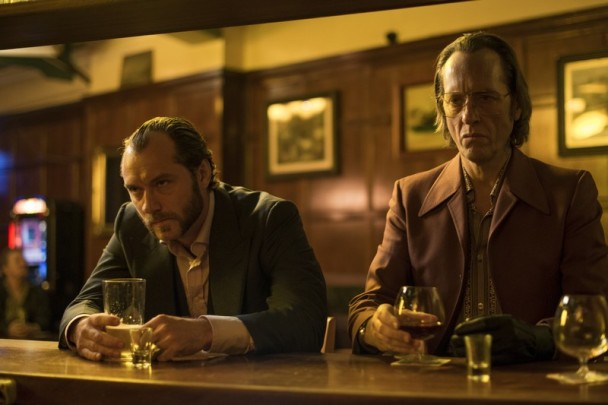 American writer/director Richard Shepard has gorgeous form in sullying matinee idols, giving Pierce Brosnan his best role as a boozy, whoring, shaky-fingered hitman in The Matador (2005). That was a better film because Brosnan was a more naturally sardonic fit for a vain, handsome man going to seed (he’d already happily undercut his image in The Tailor of Panama).
American writer/director Richard Shepard has gorgeous form in sullying matinee idols, giving Pierce Brosnan his best role as a boozy, whoring, shaky-fingered hitman in The Matador (2005). That was a better film because Brosnan was a more naturally sardonic fit for a vain, handsome man going to seed (he’d already happily undercut his image in The Tailor of Panama).
The Matador also had a more tensely involving plot than Shepard remembers to write here. Dom simply gets out of jail after keeping silent for 12 years on his heist accomplices, during which time his wife has died of cancer. His loyal retainer Dickie (Richard E. Grant) takes him straight to the pub (where the smoking ban is unilaterally revoked), then on to the south of France estate of Mr. Fontaine (Demian Bichir), the gangster he’s stayed silent for. A fitting reward is given then cruelly dashed from his grasp (an epic coke and booze binge is a contributing factor), and Dom finds himself back on the south London streets, begging for forgiveness from a daughter and grandson he’s barely known, and work from Lestor (Jumayn Hunter, pictured below left), the son of an old rival, now running a crime empire that wheezing Dom, with his pre-digital skills, needs humbling scraps from.
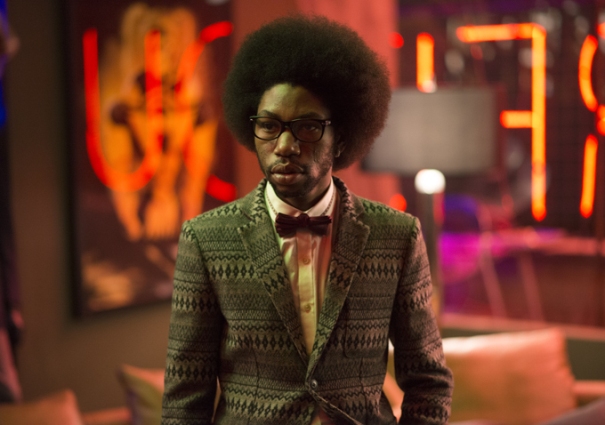 The sentimental family subplot feels wheeled in from a very different film. Redemption isn’t Dom’s style. Like Bichir’s sheathed, polite threat as Fontaine and the childishly resentful Lestor, Law’s outlandish mockney creation suggests the cartoonish work of a more talented Guy Ritchie, not Shepard’s British crime character models, the more unnervingly convincing Sexy Beast and The Hit.
The sentimental family subplot feels wheeled in from a very different film. Redemption isn’t Dom’s style. Like Bichir’s sheathed, polite threat as Fontaine and the childishly resentful Lestor, Law’s outlandish mockney creation suggests the cartoonish work of a more talented Guy Ritchie, not Shepard’s British crime character models, the more unnervingly convincing Sexy Beast and The Hit.
The film’s real emotional counterweight is Richard E. Grant’s Dickie, the 10% and maybe much more that isn’t just about Dom. Dressed in superfly fashion from the Seventies, when he last felt on top, and blatantly, beautifully channelling Withnail, Dickie’s loyal love for Dom, and childish delight when he seems set to head-butt the odds and win the day, is perfect. Everything else is a long, wild riff by Shepard and Law, worth hearing at least once.
Overleaf: watch the trailer for Dom Hemingway

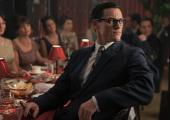
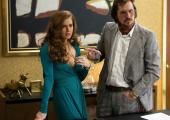
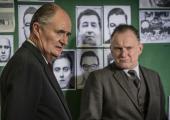






 American writer/director Richard Shepard has gorgeous form in sullying matinee idols, giving
American writer/director Richard Shepard has gorgeous form in sullying matinee idols, giving  The sentimental family subplot feels wheeled in from a very different film. Redemption isn’t Dom’s style. Like Bichir’s sheathed, polite threat as Fontaine and the childishly resentful Lestor, Law’s outlandish mockney creation suggests the cartoonish work of a more talented
The sentimental family subplot feels wheeled in from a very different film. Redemption isn’t Dom’s style. Like Bichir’s sheathed, polite threat as Fontaine and the childishly resentful Lestor, Law’s outlandish mockney creation suggests the cartoonish work of a more talented